- Nameadmin
- Date2017/07/07 00:00
- Hit919
- KIGAM opened a trilateral research conference for Geoscience research in Northeast Asia
- Discussions on Active Fault, Gas Hydrate and other main geoscience issues in Northeast Asia
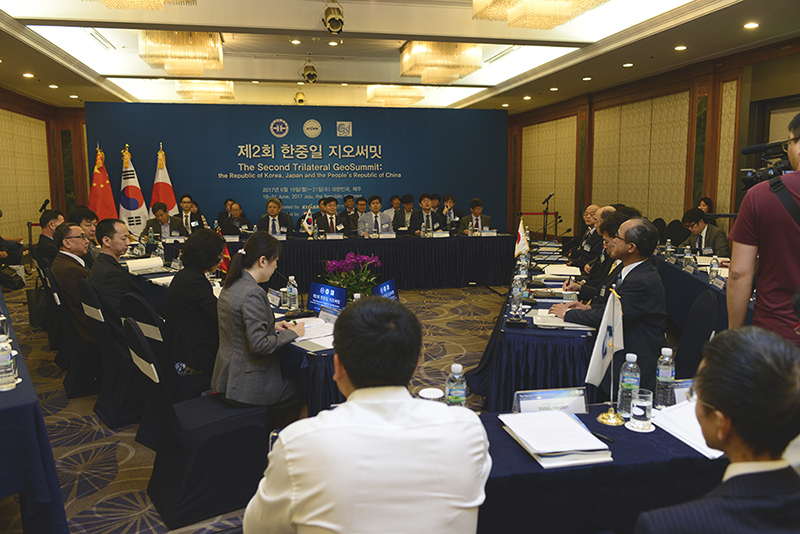
With recent geological instability around the world and political uncertainty in Northeast Asia, political tension among Korea, China and Japan is being prolonged. In the midst of this time, leaders and experts of representative geological research institutions of the three countries gathered. The Second Trilateral GeoSummit, held by Korea Institute of Geoscience and Mineral Resources (KIGAM), is standing in the middle of the turmoil.
With China Geological Survey (CGS) and Geological Survey of Japan (GSJ)’s help, KIGAM held the Second Trilateral GeoSummit in Maison Glad, Jeju on 20 June 2017.
The Trilateral GeoSummit is an international conference where leaders and experts of geological research institutions of Korea, China and Japan gather to solve geoscience issues in Northeast Asia.
The Second Trilateral GeoSummit was held by KIGAM, the only government funded research institution on geology in Korea, with help of CGS and GSJ, the representative geological institutions of China and Japan. The First Trilateral GeoSummit was held in 2015.
Opening of The Second Trilateral GeoSummit in Korea is very significant for KIGAM’s Centennial Anniversary is in 2018.
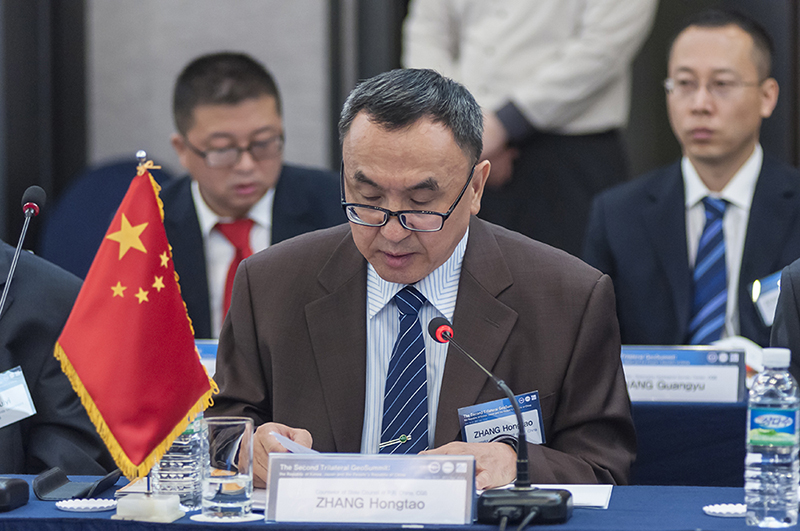
The Second Trilateral GeoSummit was held to overcome political and historical struggles among Korea, China and Japan and to solve various geoscience issues in Northeast Asia under the theme, “Sustainable international cooperative researches on Northeast Asian geoscience field.
Dr. Joong-Ho Synn, the President of KIGAM, Dr. Zhang Hongtao, the Counselor of State Council of People’s Republic of China, and Dr. Yusaku Yano, the Director General of GSJ, attended as representatives of the three countries, and eighty geoscience experts along with Mr. Yang Houlan, the Secretariat-General of Trilateral Cooperation Secretariat (TCS)*, shared and discussed deeply to solve geoscience issues.
The Trilateral GeoSummit is considered as an exemplary model of international research conference for overcoming regional and ideological conflicts.* Established in September, 2011 in Seoul, the Trilateral Cooperation Secretariat is an international organization for supporting trilateral relation among Korea, China and Japan. It holds and supports trilateral summits, research projects and academic conferences.
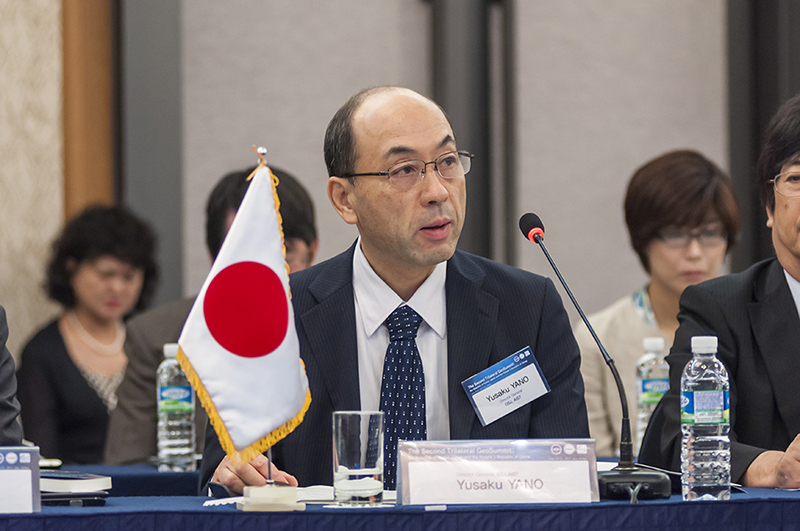
The three countries chose the four major geological issues of both Northeast Asia and the entire globe, Active Fault, Coastal Geology, Gas Hydrate and Geo Information System, as four main topics of the Second Trilateral GeoSummit. The Second Trilateral GeoSummit is grabbing a broad attention for having issues related to public’s safety and efficient usage of energy resources, which are major interests of Korean government under the new president.
Mr. Yang Houlan, the Secretariat-General of TCS, gave a keynote speech named, “Strengthen Trilateral Cooperation among China, Japan and ROK,” in order to emphasize the importance of cooperative researches on geoscience for sustainable development of Northeast Asia.
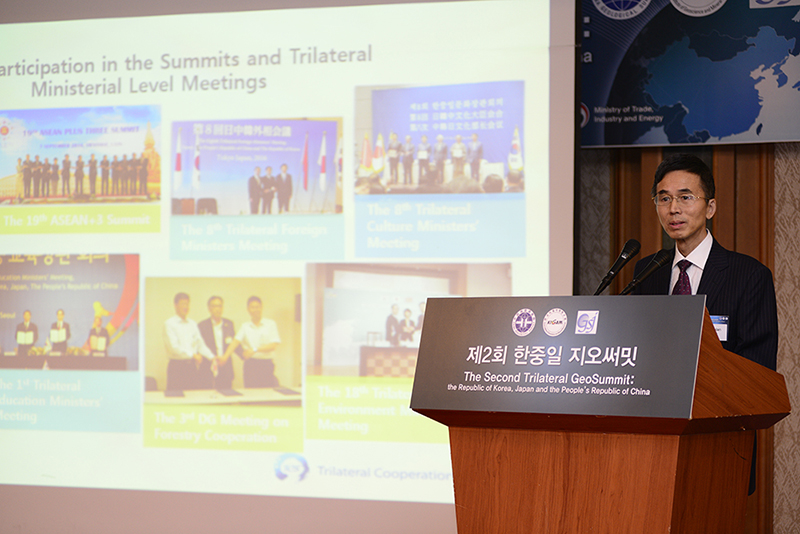
From the presentations and in-depth discussions of the three countries’ experts during technical sessions, the Second Trilateral GeoSummit achieved various visible successes.- Trilateral research projects on Active Fault, Coastal Geology and Geo Information System (GIS).- Bilateral research project between Korea and China on Gas Hydrate, which is known as the burning ice, the main energy resource for the next-generation.- Systematic and developmental trilateral research projects by annual workshops and experts’ meetings.
On Active Fault, which became a national interest after the Gyeongju earthquake on September 2016, Korea, China and Japan decided to begin a trilateral research project by analyzing major faults* in order to evaluate risk of earthquakes. Also, the research project is very meaningful because it is the first cooperative research project on the topic.*Yangsan Fault in Korea, Tan-Lu Fault in China and Median Tectonic Line in Japan.
On Coastal Geology, Korea and China agreed on sharing technologies and research results about coastal geological hazards, Korea and Japan agreed on exchanging expert researchers on offshore geology and Korea, China and Japan agreed on biannual trilateral workshops and detailed action plan to support CCOP* countries. ※ CCOP (Coordinating Committee for Geoscience Programmes in East and Southeast) is an intergovernmental organization to solve geological issues in East and Southeast Asia and improve the quality of research technologies. It consists of fourteen member countries* such as Korea, China, Japan, Indonesia, Thailand, Singapore, Philippines and Vietnam, and fourteen cooperating countries** which support CCOP by contributing resources, technologies and experts.*14 Member Countries: Korea, Cambodia, China, Indonesia, Japan, Malaysia, Singapore, Papua New Guinea, Philippines, Thailand, Vietnam, Dong Timor, Laos and Myanmar**14 Cooperating Countries: Australia, Belgium, Canada, Denmark, Finland, France, Germany, Norway, Poland, Russia, Sweden, United Kingdom and United States of America.
On GIS, the three countries will start the first cooperative research project on geoinformation management system and development of GIS based geospatial integration by using metadata system. The three countries will cooperatively research on future prediction and response system of Geoinformation, which is one of the main interests of KIGAM.
On Gas Hydrate, on which the three countries are competing to research and develop.
China presented the recent success on pilot production of Gas Hydrate in the South China Sea and discussed about future research exchanges with Korean experts. As a concrete action plan, CGS and Development Mineral Resources, Ministry of Trade, Industry and Energy (MOTIE), Korea signed a Memorandum of Understanding on researches, developments and productions of Gas Hydrate.
After the first pilot production of Gas Hydrate in Japan in 2013, KIGAM is having a cooperative research project with Japan’s MH21 research team and JOGMEC for excavation and commercialization of Gas Hydrate. Through this GeoSummit, the three countries agreed to continue active trilateral research projects to stably excavate Gas Hydrate, which will replace fossil and nuclear fuels as an environment-friendly resource.
Workshop on 3D Geological Modeling, which was the main topic of the First Trilateral GeoSummit, was held as a special session. In the session, Korea and China agreed on constructing geological modeling, integration of spatial data, cloud-based geological modeling service, mineral potential mapping and other research presentations. They also had discussions on bilateral exchange of technologies and forming a Task Force team for concrete progress of cooperative research.
Starting from the First Trilateral GeoSummit in China, the Trilateral GeoSummit is held biannually in rotation among China, Korea and Japan. Different cooperative research topics are selected and discussed in each GeoSummit. The Third Trilateral GeoSummit will be held in Japan in 2019.
* 2017 in Korea held by KIGAM / 2019 in Japan held by GSJ / 2021 in China held by CGS
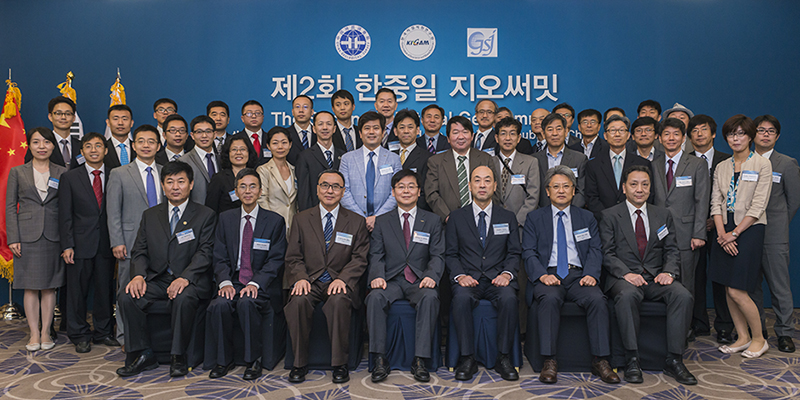
Dr. Young-Joo LEE, the Director of Global Cooperation Division, who managed the Second Trilateral GeoSummit, said “The Second Trilateral GeoSummit showed KIGAM’s leadership in the geoscience field over not only Asia but also the globe.” He also added, “I hope to see the positive impact of cooperative research projects which would contribute not only on development of geoscience researches but also on improvement of relationship among Korea, China and Japan.
Dr. Joong-Ho Synn, the President of KIGAM, said “The Trilateral GeoSummit is opening a new chapter for collaboration of geoscience researches in Northeast Asia, which was hindered by political and other regional struggles.” He also added, “I believe that the three countries will escape from politically, economically and geographically rough path through the Trilateral GeoSummit, and KIGAM, as a representative geoscience research institution of Asia, will lead the enlargement of K-Geoscience and solving global geoscience issues.
KIGAM is a representing institution of Korea in CCOP, and Dr. Joong-Ho Synn is a chairperson of CCOP steering committee since 2016. KIGAM is standing at the frontline of reacting to global weather changes and retaining future mineral resources by playing a leading role in major international geoscience organizations such as CCOP and the Trilateral GeoSummit.